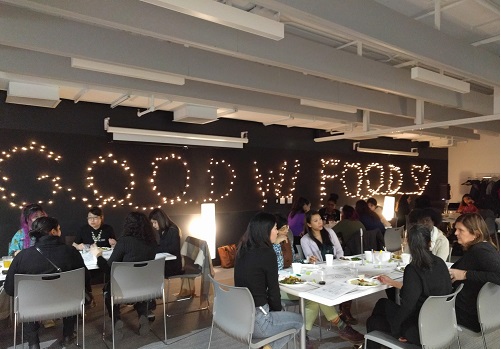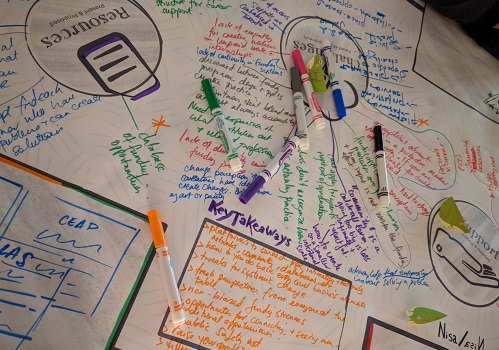It all started with the idea of using food as a method to gather research. Between October 2019 and February 2020, we had the opportunity to curate Good w/ Food, a series of community dinners as a way to conduct research and better understand the needs of creative women entrepreneurs. An initiative of OCAD U’s Centre for Emerging Artists & Designers, this iteration of the Good w/ Food dinner series created a space for creative women and individuals of marginalized genders[1] to gather over food, share their stories and foster meaningful connections with each other.
While we ate our meals, prepared by Nish Dish (Toronto-based Indigenous restaurant caterer), we recorded our conversations on specially designed “tablecloths” which prompted conversation and social interaction.
Community dinner fosters connection, insights
This dinner format enabled intergenerational creative entrepreneurs, at all stages of their careers, to actively build community and authentic social relationships, while sharing insights about the opportunities and challenges they faced. Through the dinners we were able to identify the barriers and challenges faced by creative entrepreneurs, and highlight support organizations and resources that are dedicated to fostering women-centric, community-oriented programming.
Our work reveals a range of ongoing challenges faced by creative women entrepreneurs in the entrepreneurial ecosystem. Our findings are important because we provide a deeper understanding of how creatives see themselves in Canada’s entrepreneurial ecosystem, and the systemic shortcomings of traditional entrepreneurship programming. It serves as a vital reminder that we need relevant support structures and policies which effectively support women, individuals of marginalized genders, and equity-seeking groups. Our insights are even more critical because these challenges have been exacerbated by the Covid-19 pandemic.
Factors that impact success
Our discussions elucidated a host of factors influencing the success of creative entrepreneurship in marginalized groups.[2]
1.There is increasing recognition that creatives do not operate as stereotypical entrepreneurs. Creative entrepreneurs are thus excluded from the support structures created for traditional entrepreneurs because these are not tailored to the needs of creatives. In supporting creative entrepreneurs, policies and resources need to consider models of entrepreneurship that are not solely focused on growth and profit but also capture values such as community care and social responsibility.
2. Insufficient government policies and a lack of understanding of the actual types of work that creative entrepreneurs engage in has resulted in a lack of resources and supports. For instance, the Government of Canada’s initial launch of Covid-19 response programs systematically left out self-employed artists, freelancers, and small arts organizations. Through intensive community advocacy, the government eventually expanded programs to be more inclusive, but the initial exclusion speaks to a lack of macro level understanding of how creatives operate.
3. The issues in the entrepreneurial ecosystem are exacerbated by additional intersectional barriers, such as gender discrimination in existing entrepreneurial programming and supports. Traditional entrepreneurship programming continues to be dominated by men and masculine archetypes and thus disregards the variety of ways that all genders participate in entrepreneurship.
4. There is a need for structures and resources that actively support equity-seeking groups. Our dinner-conversation research format highlights the importance of programming that fosters authentic and meaningful connections, diverse social relationships, and inclusive environments in the entrepreneurial process. There is a need for women-oriented events that allow women and individuals of marginalized genders to connect and share stories in an environment that feels safe and comfortable.
Support for future programs
Insights from this project have been used to inform future program development and advocacy work done by OCAD University to support creative entrepreneurs – with a particular focus on underrepresented and equity-seeking individuals. In order to foster a truly inclusive and vibrant entrepreneurship ecosystem, policy, support structures and resources need to support the diversity of organizations and individuals that actually exist in the ecosystem. This means broadening definitions to include organizations that focus on social impact and sustainability instead of growth and scalability, understanding the intersectional impacts on access to opportunities, and creating safe and supportive spaces for equity-seeking groups.
We conducted our research in conjunction with the Women’s Entrepreneurship Knowledge Hub (WEKH), a nation-wide network led by Ryerson University’s Diversity Institute, the Brookfield Institute for Innovation + Entrepreneurship, and the Ted Rogers School of Management. This is an initiative funded by the Government of Canada which aims to address barriers and enhance women’s entrepreneurship in Canada. More about WEKH is available at wekh.ca
[1] This use of language is not to erase the experience of trans, non-binary, and Two-Spirit people within entrepreneurship, and our own participants, but rather to make explicit the lack of research including the explicit inclusion and representation of trans, non-binary, and Two-Spirit people.
[2] The full details of our findings can be found in our extended report “Critical Perspectives on Women’s Entrepreneurship”.
Dr. Alia Weston is an Associate Professor of Creative and Business Enterprise at OCAD University. Her research examines the intersection of business, creativity and social change. Through her work she questions dominant paradigms and redefines how we understand knowledge; exploring themes such as critical business, creativity in resource constraints, social innovation, experiential food methodology, and creative entrepreneurship. Her work has been published in scholarly journals and books, and showcased in popular media such as the Globe and Mail and CBC Radio. Alongside her academic work, Alia works as a jewellery designer and entrepreneur. She runs the Alia Weston Jewellery and Fireflies Atelier jewellery brands and uses these as living research projects when teaching OCAD U students about the how-to aspects of running a creative business.
Alexandra Hong is the Project Officer at OCAD University’s Centre for Emerging Artists & Designers. She is leading the centre’s Creative Entrepreneurship portfolio, working to build resources, capacity and opportunities for emerging creatives. A practicing artist, she is interested in exploring borders of experience, questioning ways of gaining knowledge, and creating spaces for dialogue amid hardened ideologies. Alexandra’s work has been shown with CBC Arts, Nuit Blanche Toronto, the Ryerson Image Centre, and presented internationally in South Korea, China, and Finland. She is a recipient of an Ontario Centres of Excellence (OCE) and Social Sciences and Humanities Research Council (SSHRC)’s Social Entrepreneurship Fellowship for her work in exploring the role of art in social innovation.




